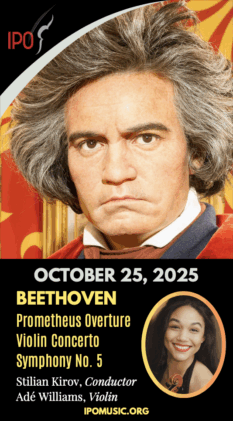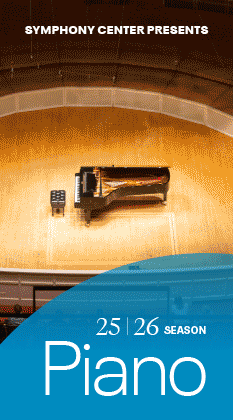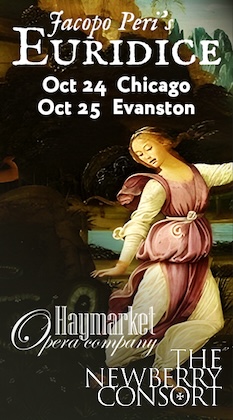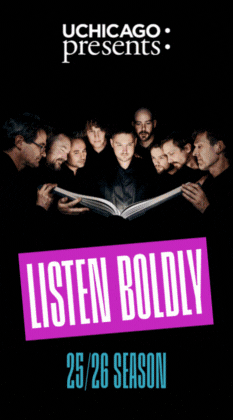Belcea Quartet delivers world-class artistry for UChicago Presents series
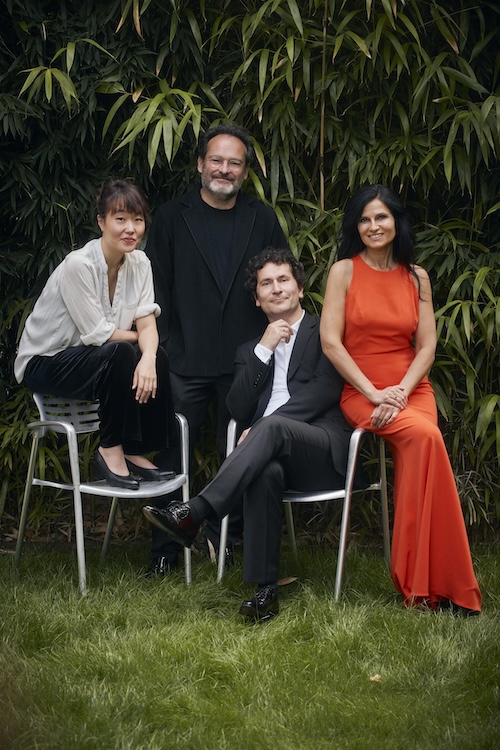
The world’s greatest chamber groups always make one feel that whatever repertoire they happen to be playing, they seem ideally suited to that particular composer.
Such was the case Friday night at Mandel Hall when the Belcea Quartet made a welcome return to the University of Chicago Presents series.
The Hyde Park concert series seems to be going through something of a transitional era, one not without some uncertainty. Back in the day the entire series was devoted to classical music, spread out among various subgenres. The addition of jazz and blues series and world music may have broadened the audience reach but it has also significantly decreased the number of classical programs by top international ensembles (as have the dates now routinely allotted to Chicago Symphony Orchestra members for chamber concerts). There has also been a tendency to water down repertoire, nudging even the ostensibly classical programs towards lighter and more crossover-y material.
Fortunately, Friday night’s concert provided a restorative of sorts, making manifest that there is no substitute for a first-class, full-time chamber group.
Now in its 31st season, the Belcea Quartet, like many venerable ensembles, has seen its share of personnel changes. Founding first violinist Corina Belcea and violist Krysztof Chorzelski are the only remaining original members; cellist Antoine Lederlin joined the quartet in 2006, followed by second violinist Suyeon Kang in 2022.
Yet such was the technical poise, seamless ensemble and interpretive insight in their stellar performances Friday night, one was left wondering if the Belcea roster has ever had a finer lineup than it does currently.
Quite simply, these were stunning, world-class chamber performances, led by the Belcea’s stoic, eponymous leader with faultless violin playing. The fact that the group was performing in a hot and uncomfortable 80-degree room—something of a regular occurrence for them in this series—made the stellar quality of the concert even more notable. (The only obvious technical mishap came in the concert’s opening seconds with Lederlin’s cello endpin sliding out of place during the first piece.)
The program also nicely upended the usual chronological ordering, beginning with Mendelssohn and ending with Mozart.
Two of Mendelssohn’s Four Pieces, Op. 81, led off the evening and made a worthy calling card. These miscellaneous works were written on different occasions and assembled by the composer’s publisher after his death.
The Fugue in E flat, written at age 18, is an astonishing piece even by Mendelssohn’s degree of creative precocity. Violinist Belcea set the tone for this somber, slow-weaving counterpoint, the musicians’ refined tone and sensitive phrasing bringing out the expressive depth of this music with a natural, understated eloquence. The ensuing Capriccio (No. 3) shifted from minor-key drama to a furious fugue, played with incisive vigor and striking velocity.
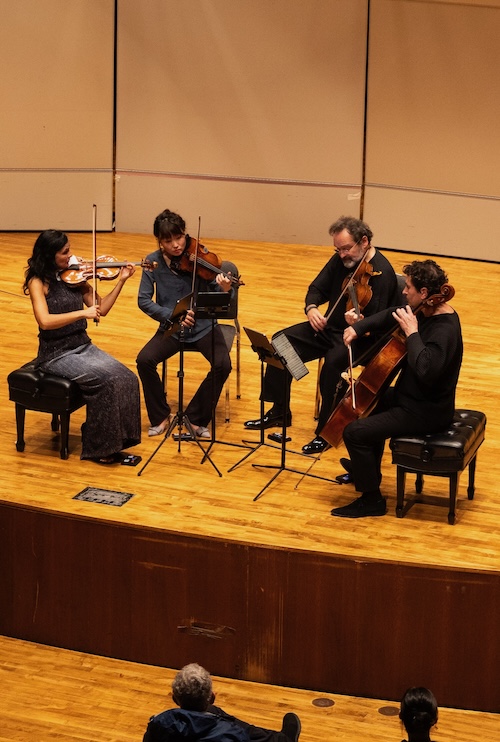
Beethoven’s Quartet in F major was the composer’s final completed work. Which seems right since despite the composer’s much-analyzed scrawl on the score (“Must it be? It must be.”), Op. 135 shows the composer in his jokey musical mood as much as leaning into the philosophical depths.
The Belcea musicians held the contrasting elements in a finely balanced alignment, their rhythmic kick putting across the quirky good humor of the opening Allegretto with its jagged edges and abrupt stops. The motoric ensuing Vivace was striking for the polished, unruffled virtuosity the players brought to its frenzied bustle and hairpin dynamic turns.
So too in the finale, the players, captured Beethoven’s playful yet advanced writing. Every oddball element registered with full impact—the strident violin chords, the phrases ending in midair, and the piquant pizzicato take on the main theme—all capturing the off-center, gamboling quality of the composer’s swan song.
Yet this Beethoven performance reached its peak in the slow movement. With Belcea’s noble, dark-toned Guadagnini violin leading a spacious tempo, the performance seemed to get to the heart of this music, the playing suffused with an otherworldly repose that was both musically apt and raptly beautiful.
The concert ended with Mozart’s Quartet in C major, K.465, the “Dissonance,” a work whose scale and depth made it a worthy closer.
The Belcea Quartet’s lightish sonority and tonal refinement make it ideal for Mozart’s music. The players brought out the ominous nature of the discordant slow introduction in a jarring and impactful way; one can only imagine what Vienna audiences thought when they heard this music in 1785. A graceful segue led into the unclouded good cheer of the characteristic Allegro theme.
The elevated Andante was explored with a terraced degree of dynamics and inward expression. The playful Minuet was deftly contrasted with the more edgy and nerve-wracked middle section.
The musicians took the “very fast” marking of the final movement at face value, with dazzling articulation by violinist Belcea highlighting the whirlwind virtuosity of all in the finale, the quartet members delivering a virtual seminar in Mozart performance.
The stellar performance elicited cheers and a partial standing ovation from the sometimes-perfunctory Hyde Park audience. Still, no encore was given on this occasion.
Even so, the Belcea Quartet delivered consummate artistry and a highlight of the musical season that had at least one audience member digging through shelves for their recordings and making plans to order more. Let us hope that they soon return in the flesh as well.
Kubasy performs Songs of the Ukrainian Forest 3 p.m. Sunday at the Logan Center. chicagopresents.uchicago.edu
Posted in Performances
